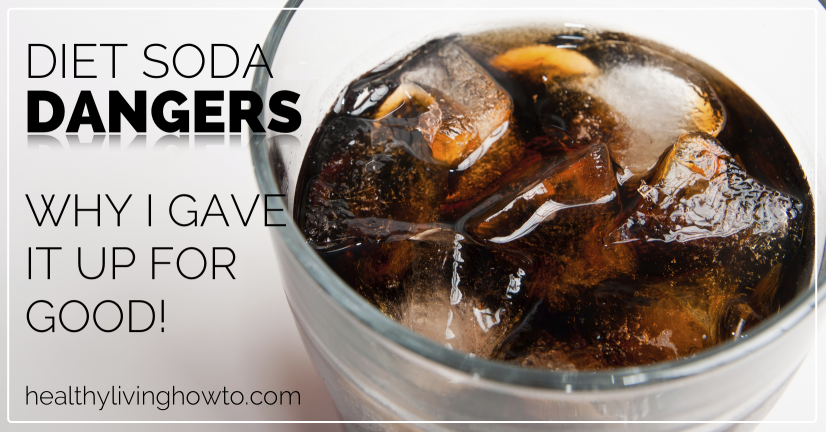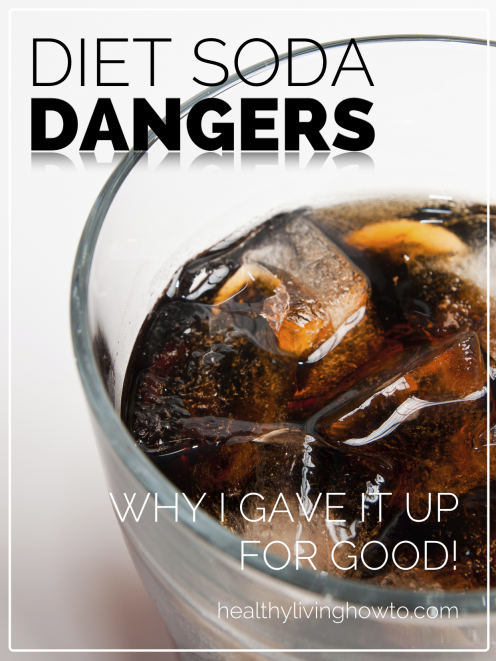Today, I am going to tell you about the dangers of diet soda and why I gave it up for good. In Minnesota we call soft drinks “pop”. We stopped buying diet pop on our weekly grocery store trips a few years ago. However, I still imbibed in my favorite beverage when I was out and about. My daily habit has dwindled significantly in the recent past, but a 20 oz. bottle from the gas station found its way into my hands three to four times a week. I haven't had a drink of diet pop since July 4, 2011.
In order to understand my position on this, I have to set the scene for you, by talking some science. But don't worry; if you failed Human Biology like I did, as a freshman in college, I like to keep the explanations pretty basic. We are going to briefly explore the nervous system and then get right into the meat of the matter, how diet pop affects our brain.
Diet Soda Dangers | Nervous System Basics
In simplest terms, the function of the nervous system is to send signals or messages from one cell to another or from one part of the body to another. Cells send messages via a neurotransmitter to another cell. The neurotransmitter is responsible for activating the receptor on the receiving cell. Think of it this way, you can't catch a ball with a closed glove, neurotransmitters open the glove. Two major neurotransmitters are glutamate and aspartate. The list of recognized nervous system related diseases and disorders is lengthy, it includes Alzheimer's, Parkinson's, Dementia, Multiple Sclerosis, Lou Gherig's, Huntington's, Tourette's, Stroke, Epilepsy, Meningitis, Headaches/Migraines, Bell's Palsy, Autism, Autoimmune Disorders, Sleep Disorders, and more.
Diet Soda Dangers | Glutamate & Aspartate
In addition to being amino acids, these two neurotransmitters are classified as excitatory. Their job is to excite the receptor cell and get it to “open up”, and catch the incoming message. Under ordinary circumstances, glutamate and aspartate are manufactured and contained inside the cell. They are released from the cell in tiny amounts, only for transmitting purposes, and then they immediately retreat and go back into their home cell. Aspartate and glutamate become excitotoxins when their levels become elevated and the contact with the receptor cell is sustained. They basically excite the receptor cell to death. Although cell death is a normal occurrence, if we speed up the rate of cell death, aging increases as does the susceptibility of disease and ill-health.
Diet Soda Dangers | Excitotoxins
Excitotoxins are amino acids that react with receptors of a cell in way that results in cell death. They play a significant role in the development of not only neurodegenerative diseases, but also neurological disorders, endocrine disorders, autoimmune disorders, obesity and learning disabilities. Glutamate and aspartate are examples of endogenous excitoxins, meaning they are from within the body. An exogenous excitotoxin is any toxin ingested from outside the body which also results in neurotoxicity and cell death. The main source of exogenous excitotoxins in the processed food supply is MSG & Aspartame.
Diet Soda Dangers | MSG & Aspartame
Monosodium Glutamate (MSG) is one of several forms of glutamate found in the food supply. It is used heavily in processed foods to give flavor. Glutamate also hides in hydrolyzed vegetable proteins, autolyzed yeast, hydrolyzed yeast, yeast extract and soy extracts. Aspartame is 50% aspartate and is the most widely used non-caloric sweetener, in just about every diet beverage and sugar-free gum. If the food you eat comes in a box, chances are it has one or both of these.When both glutamate and aspartate are ingested orally through food and beverages, they are absorbed into the blood very rapidly. They make their way to brain cells and get right to doing their job of exciting the cell. However, since these are exogenous (come from outside the body), they don't have a home cell to retreat to. Which means they will continue to excite the receptor cell until it dies.
Click Here to Pin Diet Soda Dangers
Diet Soda Dangers | Health Effects
For some, the ingestion of exogenous excitotoxins is immediately realized. Symptoms like headaches and stomach distress are common complaints. For most, the effects of exogenous excitotoxins are very subtle and take time, perhaps years to develop. While they are not the direct cause of neurological diseases and disorders, they most definitely worsen their pathology. Some diseases of the nervous system may have a genetic component; however, the propensity to develop the disease can be lessened by limiting exposure to exogenous excitotoxins. Those who are already inflicted with a disease or disorder of the nervous system, exogenous excitotoxins are kindling to the fire. It is also important to note, although exogenous excitotoxins should be avoided by everyone, children and pregnant women especially, should avoid them. The effects are even more toxic on a developing brain.
Diet Soda Dangers | Why I Gave Up Them Up
This information about MSG and Aspartame has been around for a long time. I remember first reading about it in the mid-'90's. Over the years as new research emerged I would read it and discard it. I gave up processed foods many years ago and what little things we buy with a label, I always scan for MSG and its counterparts. So why did I wait until now, to quit diet pop? Plain and simple, I didn't want to believe it could affect me. As the saying goes, seeing is believing. I am now seeing firsthand what a progressive brain disease does to a person. My mother has Lewy Body Disease, it's a form of dementia; similar to Alzheimer's and Parkinson's. She started showing symptoms before the age of 60. In a few short years this disease has taken my mom from me, not physically, but mentally. My mom's diet for many, many years consisted of crackers, diet soda and Weight Watcher's diet frozen meals (MSG and Aspartame overload). She also loved her sweets! Within the past couple years she started experiencing a violent reaction to MSG and now avoids it, but she still has to have her Diet Coke.
Putting my genetic risk aside, 5.4 million people in the United States have Alzheimer's; this is expected to more than double by 2050. It is among the top 10 killers of Americans, costing 183 billion dollars in annual health care costs. Although my chances of developing this may be higher, it seems you have a pretty good chance as well. Neurological diseases and disorders are on the rise, affecting about a billion people worldwide. Even though research today has not yet found glutamate and aspartate directly responsible for causing these disorders, they are a contributing factor. Pop is not worth it!
“Thus, it is an ironic fact that today knowledgeable neuroscientists in many parts of the world are working fervently to develop methods for preventing endogenous excitotoxins from damaging the human brain, while other elements of society, including the FDA, are promoting and sanctioning the adulteration of foods with unlimited amounts of exogenous excitotoxins which are known to destroy nerve cells in the mammalian brain following oral intake.”
Dr. John Olney, renowned neuroscientist and foremost authority on excitotoxins, addressing the United States Senate regarding the use of Aspartame & MSG in our food supply.
Want to read more about Diet Soda Dangers?
- Are you using diet soda to overcome sugar cravings? Here are 14 Ways to Overcome Sugar Addiction that don't include diet soda.
- Aspartame isn't just in diet soda, it's in chewing gum as well. Check out the Surprising Health Dangers of Chewing Gum to learn more.
- Do you know The Sneaky Story of How Aspartame Became Legal?
- Here's a Spin on Aspartame that lays the record straight.

